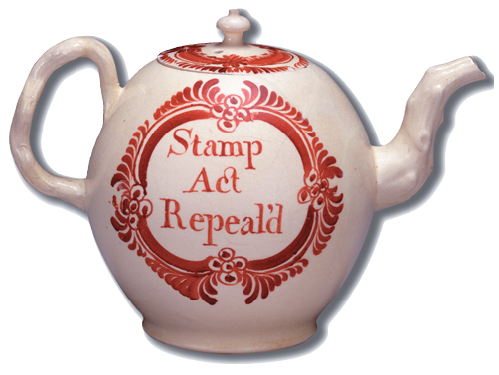Liberty and Property.
Printed Page 144 Chapter Chronology
Liberty and Property. Boston's crowd actions of August sparked similar eruptions by groups calling themselves Sons of Liberty in nearly fifty towns throughout the colonies, and stamp distributors everywhere hastened to resign. A crowd forced one Connecticut distributor to throw his hat and powdered wig in the air while shouting a cheer for "Liberty and property!" This man fared better than another Connecticut stamp agent who was nearly buried alive by Sons of Liberty. Only when the thuds of dirt sounded on his coffin did he have a sudden change of heart, shouting out his resignation to the crowd above. Luckily, he was heard. In Charleston, South Carolina, the stamp distributor resigned after crowds burned effigies and chanted "Liberty! Liberty!"
Some colonial leaders, disturbed by the riots, sought a more moderate challenge to parliamentary authority. In October 1765, twenty-seven delegates representing nine colonial assemblies met in New York City as the Stamp Act Congress. For two weeks, the men hammered out a petition about taxation addressed to the king and Parliament. Their statement closely resembled the first five Virginia Resolves, claiming that taxes were "free gifts of the people," which only the people's representatives could give. They dismissed virtual representation: "The people of these colonies are not, and from their local circumstances, cannot be represented in the House of Commons." At the same time, the delegates carefully affirmed their subordination to Parliament and monarch in deferential language.
Nevertheless, the Stamp Act Congress, by the mere fact of its meeting, advanced a radical potential — the notion of intercolonial political action. The rallying cry of "Liberty and property" made perfect sense to many white Americans of all social ranks, who feared that the Stamp Act threatened their traditional right to liberty as British subjects. The liberty in question was the right to be taxed only by representative government. "Liberty and property" came from a trinity of concepts — "life, liberty, property" — that had come to be regarded as the birthright of freeborn British subjects since at least the seventeenth century. A powerful tradition of British political thought invested representative government with the duty to protect individual lives, liberties, and property against potential abuse by royal authority. Up to 1765, Americans had consented to accept Parliament as a body that represented them. But now, in this matter of taxation via stamps, Parliament seemed a distant body that had failed to protect Americans' liberty and property against royal authority.

Alarmed, some Americans began to speak and write about a plot by British leaders to enslave them. A Maryland writer warned that if the colonies lost "the right of exemption from all taxes without their consent," that loss would "deprive them of every privilege distinguishing freemen from slaves." In Virginia, a group of planters headed by Richard Henry Lee issued a document called the Westmoreland Resolves, claiming that the Stamp Act was an attempt "to reduce the people of this country to a state of abject and detestable slavery." The opposite meanings of liberty and slavery were utterly clear to white Americans, but they stopped short of applying similar logic to the half million black Americans they held in bondage. Many blacks, however, could see the contradiction. When a crowd of Charleston blacks paraded with shouts of "Liberty!" just a few months after white Sons of Liberty had done the same, the town militia turned out to break up the demonstration. Politicians and merchants in Britain reacted with distress to the American demonstrations and petitions. Merchants particularly feared trade disruptions and pressured Parliament to repeal the Stamp Act. By late 1765, yet another new minister, the Marquess of Rockingham, headed the king's cabinet and sought a way to repeal the act without losing face. The solution came in March 1766: The Stamp Act was repealed, but with the repeal came the Declaratory Act, which asserted Parliament's right to legislate for the colonies "in all cases whatsoever." Perhaps the stamp tax had been inexpedient, but the power to tax — one prime case of a legislative power — was stoutly upheld.
Declaratory Act
1766 law issued by Parliament to assert Parliament's unassailable right to legislate for its British colonies "in all cases whatsoever," putting Americans on notice that the simultaneous repeal of the Stamp Act changed nothing in the imperial powers of Britain.